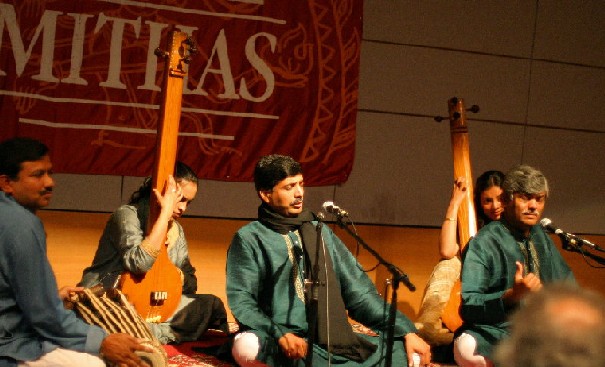Contribute
| MITHAS Presents A Dhrupad Concert By The Gundecha Brothers |
Anil Navkal
05/05/2004
MITHAS presents a DHRUPAD concert Live from MIT
The Gundecha Brothers vocal With a solo by Shubha Sankaran on Surbahar
Sunday, May 2, 2004
2:00 PM A typical, cloudy, mild high-60s weather around MIT. Not much traffic. Folks just recovering from Friday and Saturday night parties, but a small dedicated group of MITHAS volunteers are busy at the MIT Wong Theater. Purnima Sahgal on the other hand is with the Gundecha brothers to get them ready for the 4:00 PM live concert. A good two hours ahead of time, the disciplined volunteers of MITHAS are busy setting up the sound system, and taking care of the stage setup. Folks at the ticket counter, Sridhar Raaghavachari, Arpita Upadhyay, Tushneem, Srinath Nagarajan and Flute Raman are busy setting up the tables. Nothing fancy, but simple, functional, yet a pleasing Indian concert setup is being arranged. The audience always appreciates that the arrangement never takes away attention from the performing artists.
Sreekanth Sampathkumaran and Rajaram Narayanaswamy are putting together myriads of wires, testing each microphone very carefully. I am setting up to record the concert in another corner. The equipment is digital to have as true a recording as possible. Past MITHAS concerts were not recorded, therefore, at the conclusion of an incredible concert, we wished it had been captured. The time we spend now is critical for the success of the concert. Any loose connection, and the audience, along with the artists, will walk away frustrated. It's like good spelling. You are expected to spell perfectly. MITHAS has always taken pride in providing a sonically perfect concert experience. After all, it's MIT. Perfection is simply a matter of habit here.
Today is different. Ramakanth and Umakant Gundecha are making clear that they want all aspects of the audio set up exactly for their singing style. Dhrupad singing is delicate. Khurge is where the action is. The Pakhawaj can be overpowering with the wrong microphone setup. He spends a good thirty minutes testing the microphones. Every individual microphone is tested and set up to sound perfect. Shrikanth is busy making detailed notes and is listening carefully. He likes that the singers are keen on setting up microphones the way they want. That way, when the performance begins, he is sure the artists are heard as they want.
4:00 PM
The concert begins. Shubha Sankaran, disciple of Ustad Imrat Khan starts the program on the surbahar. This instrument is rarely played. There aren't too many surbahar players around, either. The sound is deeper than the sitar sound, and well suited for Dhrupad style. She renders a raag in line with Dhrupad style and plays her instrument very competently.
The Dhrupad singing tradition is at least 500 years old. Mia Tansen was the father figure in perfecting and popularizing this style. He was a singer in the court of King Akbar. At about the same time, the Dagar family took a vow to dedicate themselves to this tradition. While there were other musicians who played Dhrupad style off and on, the Dagar family never strayed from the style. So much so that Dhrupad and Dagar bani are now synonymous.
Dhrupad is difficult to practice. It requires far more perfection from an artist than any other style. Purity of note is of utmost importance. Years of hard practice are needed just to get the basics right. Performance-level perfection comes only after spending a good part of your life practicing. It also requires a high degree of concentration and inner peace.
The late Zia Mohiuddin Dagar decided to teach Dhrupad style to people outside the family. He came to the US several times in the late 1970s and early 1980s. In the early 1980s, the Gundecha brothers became his disciples.
It is obvious that the Gundecha brothers have mastered the art of Dhrupad gayakee. The alap is rendered nicely in true Dhrupad tradition, introducing a note at a time and dwelling on each newly introduced note, exploring it from all angles. The audience is gripped. It is an unhurried introduction of Dhrupad singing, very similar to what I have heard from the Dagar brothers way back.
As the alap unfolds, the inner character of it blossoms. In Dhrupad style, the singer uses the following symbols: om, nom, re, ri, ra, na, and tom, each of which denotes a form of Shiva. No real words are used during alap, as it distracts from creating sounds of pure music. The word Dhrupad means a devotional poem incorporating a refrain.
The alap is followed by zala, accompanied on pakhawaj by Akhilesh Gundecha. Akhilesh, being part of the family, is finely tuned to his brother's moods, and the overall effect is serene. A good seventy-five minutes of one raag leaves the audience in sheer ecstasy and all this before intermission!
The program continues 60 minutes after the intermission with the Gundecha brothers presenting three short pieces to round off a very memorable concert.
8:00 PM With a sense of deep satisfaction, Deepti Nijhawan, president of MITHAS, thanks all the volunteers who worked so hard to make this concert a well-tuned and pleasant experience.
Seldom do you get such total satisfaction of listening to authentic music. Years of vigorous practice, a strong sense of inner peace, along with mastery over a well-preserved ancient art of singing, left a lasting impression. Thank you, Gundecha brothers, for visiting Boston! Do come again and often.
You may also access this article through our web-site http://www.lokvani.com/
